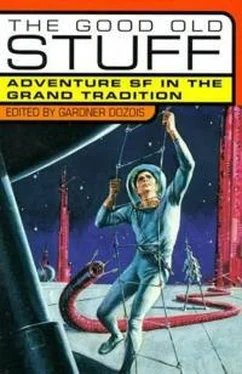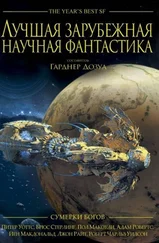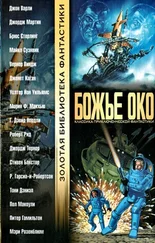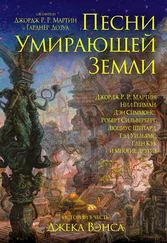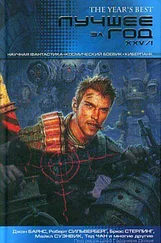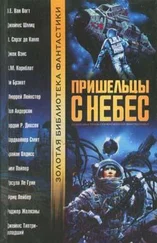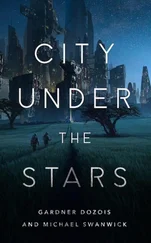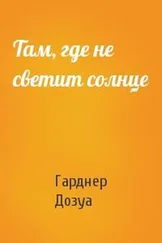Гарднер Дозуа - The Good Old Stuff
Здесь есть возможность читать онлайн «Гарднер Дозуа - The Good Old Stuff» весь текст электронной книги совершенно бесплатно (целиком полную версию без сокращений). В некоторых случаях можно слушать аудио, скачать через торрент в формате fb2 и присутствует краткое содержание. Год выпуска: 1998, ISBN: 1998, Издательство: St. Martin's Griffin, Жанр: Фантастика и фэнтези, на английском языке. Описание произведения, (предисловие) а так же отзывы посетителей доступны на портале библиотеки ЛибКат.
- Название:The Good Old Stuff
- Автор:
- Издательство:St. Martin's Griffin
- Жанр:
- Год:1998
- ISBN:0-312-19275-4
- Рейтинг книги:3 / 5. Голосов: 1
-
Избранное:Добавить в избранное
- Отзывы:
-
Ваша оценка:
- 60
- 1
- 2
- 3
- 4
- 5
The Good Old Stuff: краткое содержание, описание и аннотация
Предлагаем к чтению аннотацию, описание, краткое содержание или предисловие (зависит от того, что написал сам автор книги «The Good Old Stuff»). Если вы не нашли необходимую информацию о книге — напишите в комментариях, мы постараемся отыскать её.
The Good Old Stuff — читать онлайн бесплатно полную книгу (весь текст) целиком
Ниже представлен текст книги, разбитый по страницам. Система сохранения места последней прочитанной страницы, позволяет с удобством читать онлайн бесплатно книгу «The Good Old Stuff», без необходимости каждый раз заново искать на чём Вы остановились. Поставьте закладку, и сможете в любой момент перейти на страницу, на которой закончили чтение.
Интервал:
Закладка:
Daksat imagined a smooth pebble, magnified it to a block of marble, chipped it away to create the head of a beautiful maiden. For a moment she stared forth and varying emotions crossed her face—joy at her sudden existence, pensive thought, and at last fright. Her eyes turned milky opaque blue, the face changed to a laughing sardonic mask, black-cheeked with a fleering mouth. The head tilted, the mouth spat into the air. The head flattened into a black background, the drops of spittle shone like fire, became stars, constellations, and one of these expanded, became a planet with configurations dear to Daksat’s heart.
The planet hurried off into darkness, the Jack Vance constellations faded. Dobnor Daksat relaxed. His last image. He sighed, exhausted.
The big man in the black cloak removed the harness in brittle silence.
At last he asked, “The planet you imagined in that last screening, was that a creation or a remembrance of actuality? It was none of our system here, and it rang with the clarity of math.”
Dobnor Daksat stared at him, puzzled, and the words faltered in his throat. “But it is—home! This world! Was it not this world?”
The big man looked at him strangely, shrugged, turned away. “In a moment now the winner of the contest will be made known and the jeweled brevet awarded.”
The day was gusty and overcast, the galley was low and black, manned by the oarsmen of Belaclaw. Ergan stood on the poop, staring across the two miles of bitter sea to the coast of Racland, where he knew the sharp-faced Racs stood watching from the headlands.
A gout of water erupted a few hundred yards astern.
Ergan spoke to the helmsman. “Their guns have better range than we bargained for. Better stand offshore another mile and we’ll take our chances with the current.”
Even as he spoke, there came a great whistle and he glimpsed a black pointed projectile slanting down at him. It smack the waist of the galley, exploded.
Timber, bodies, metal flew everywhere, and the galley laid its broken back into the water, doubled up and sank.
Ergan, jumping clear, discarded his sword, casque, and greaves almost as he hit the chill gray water. Gasping from the shock, he swam in circles, bobbing up and down in the chop; then, finding a length of timber, he clung to it for support.
From the shores of Racland a longboat put forth and approached, bow churning white foam as it rose and fell across the waves. Ergan turned loose the timber and swam as rapidly as possible from the wreck.
Better drowning than capture; there would be more mercy from the famine-fish that swarmed the waters than from the pitiless Racs.
So he swam, but the current took him to the shore, and at last, struggling feebly, he was cast upon a pebbly beach.
Here he was discovered by a gang of Rac youths and marched to a nearby command post. He was tied and flung into a cart and so conveyed to the city Korsapan.
In a gray room he was seated facing an intelligence officer of the Rac secret police, a man with the gray skin of a toad, a moist gray mouth, eager, searching eyes.
“You are Ergan,” said the officer. “Emissary to the Bargee of Salomdek.
What was your mission?”
Ergan stared back eye to eye, hoping that a happy and convincing response would find his lips. None came, and the truth would incite an immediate invasion of both Belaclaw and Salomdek by the tall, thin-headed Rac soldiers, who wore black uniforms and black boots.
Ergan said nothing. The officer leaned forward. “I ask you once more; then you will be taken to the room below.” He said “Room Below” as if the words were capitalized, and he said it with soft relish.
Ergan, in a cold sweat, for he knew of the Rac torturers, said, “I am not Ergan; my name is Ervard; I am an honest trader in pearls.”
“This is untrue,” said the Rac. “Your aide was captured, and under the compression pump he blurted up your name with his lungs.”
“I am Ervard,” said Ergan, his bowels quaking.
The Rac signaled. “Take him to the Room Below.”
A man’s body, which has developed nerves as outposts against danger, seems especially intended for pain, and cooperates wonderfully with the craft of the torturen These characteristics of the body had been studied by the Rac specialists, and other capabilities of the human nervous system had been blundered upon by accident. It had been found that certain programs of pressure, heat, strain, friction, torque, surge, jerk, sonic and visual shock, vermin, stench, and vileness created cumulative effects, whereas a single method, used to excess, lost its stimulation thereby.
All this lore and cleverness was lavished upon Ergan’s citadel of nerves, and they inflicted upon him the entire gamut of pain: the sharp twinges, the dull, lasting joint-aches which groaned by night, the fiery flashes, the assaults of filth and lechery, together with shocks of occasional ten&mess when he would be allowed to glimpse the world he had left.
Then back to the Room Below.
But always: “I am Ervard the trader.” And always he tried to goad his mind over the tissue barrier to death, but always the mind hesitated at the last toppling step, and Ergan lived.
The Racs tortured by routine, so that the expectation, the approach of the hour, brought as much torment as the act itself. And then the heavy, unhurried steps outside the cell, the feeble thrashing around to evade, the harsh laughs when they cornered him and carried him forth, and the harsh laughs when three hours later they threw him sobbing and whimpering back to the pile of straw that was his bed.
“I am Ervard,” he said, and trained his mind to believe that this was the truth, so that never would they catch him unaware. “I am Ervard! I am Ervard, I trade in pearls!”
He tried to strangle himself on straw, but a slave watched always, and this was not permitted. He attempted to die by self-suffocation, and would have been glad to succeed, but always as he sank into blessed numbness, so did his mind relax and his motor nerves take up the mindless business of breathing once more.
He ate nothing, but this meant little to the Racs, as they injected him full of tonics, sustaining drugs, and stimulants, so that he might always be keyed ? to the height of his awareness.
“I am Ervard,” said Ergan, and the Racs gritted their teeth angrily.
The case was now a challenge; he defied their ingenuity, and they puzzled long and carefully upon refinements and delicacies, new shapes to the iron tools, new types of jerk ropes, new directions for the strains and pressures. Even when it was no longer important whether he was Ergan or Ervard, since war now raged, he was kept and maintained as a problem, an ideal case; so he was guarded and cosseted with even more than usual car e, and the Rac torturers mulled over their techniques, making changes here, improvements there.
Then one day the Belaclaw galleys landed and the feather-crested soldiers fought past the walls of Korsapan.
The Racs surveyed Ergan with regret. “Now we must go, and still you will not submit to us.”
“I am Ervard,’ croaked that which lay on the table. “Ervard the trader.”
A splintering crash sounded overhead.
“We must go,” said the Racs. “Your people have stormed the city. If you tell the truth, you may live. If you lie, we kill you. So there is your choice. Your life for the truth.”
“The truth?” muttered Ergan. “It is a trick—” And then he caught the victory chant of the Belaclaw soldiery. “The truth? Why not? ... Very well.” And he said, “I am Ervard,” for now he believed this to be the truth.
Galactic Prime was a lean man with reddish-brown hair, sparse across a fine arch of skull. His face, undistinguished otherwise, was given power by great dark eyes flickering with a light like fire behind smoke. Physically, he had passed the peak of his youth his arms and legs were thin and loose-jointed; his head inclined forward as if weighted by the intricate machinery of his brain.
Читать дальшеИнтервал:
Закладка:
Похожие книги на «The Good Old Stuff»
Представляем Вашему вниманию похожие книги на «The Good Old Stuff» списком для выбора. Мы отобрали схожую по названию и смыслу литературу в надежде предоставить читателям больше вариантов отыскать новые, интересные, ещё непрочитанные произведения.
Обсуждение, отзывы о книге «The Good Old Stuff» и просто собственные мнения читателей. Оставьте ваши комментарии, напишите, что Вы думаете о произведении, его смысле или главных героях. Укажите что конкретно понравилось, а что нет, и почему Вы так считаете.
